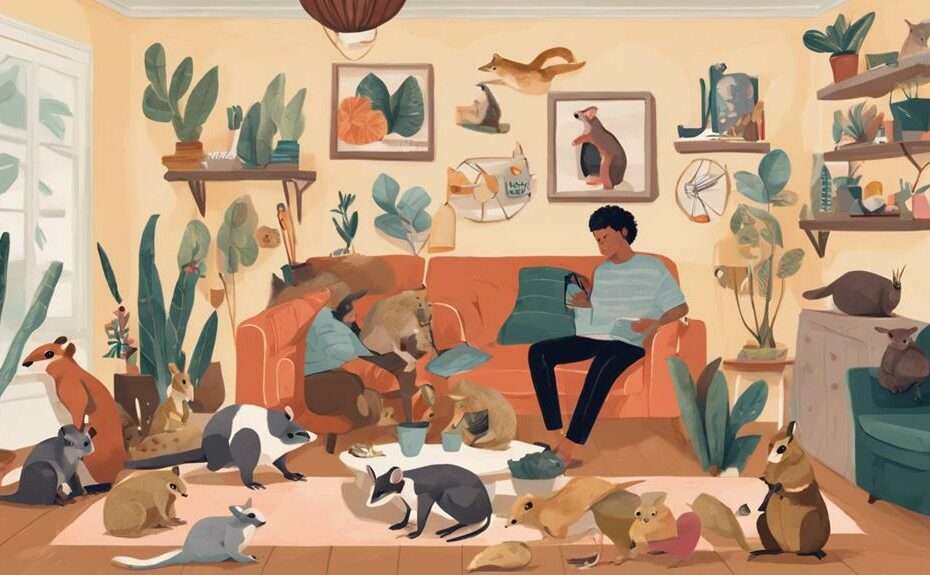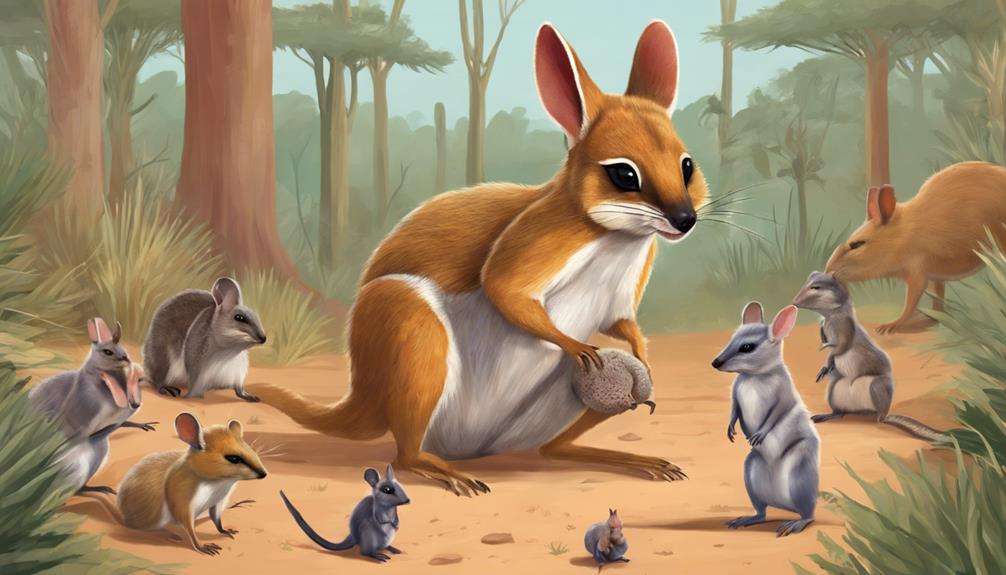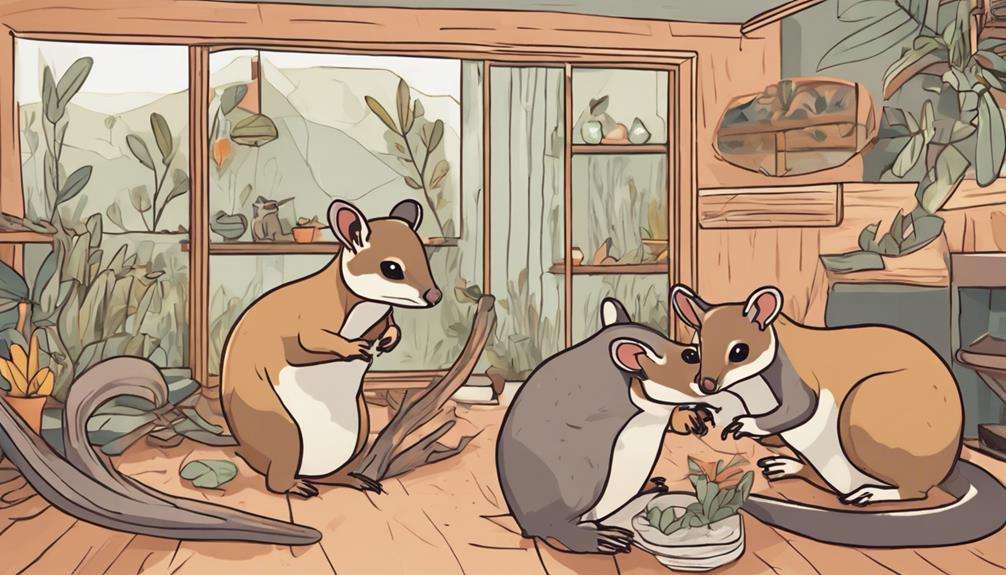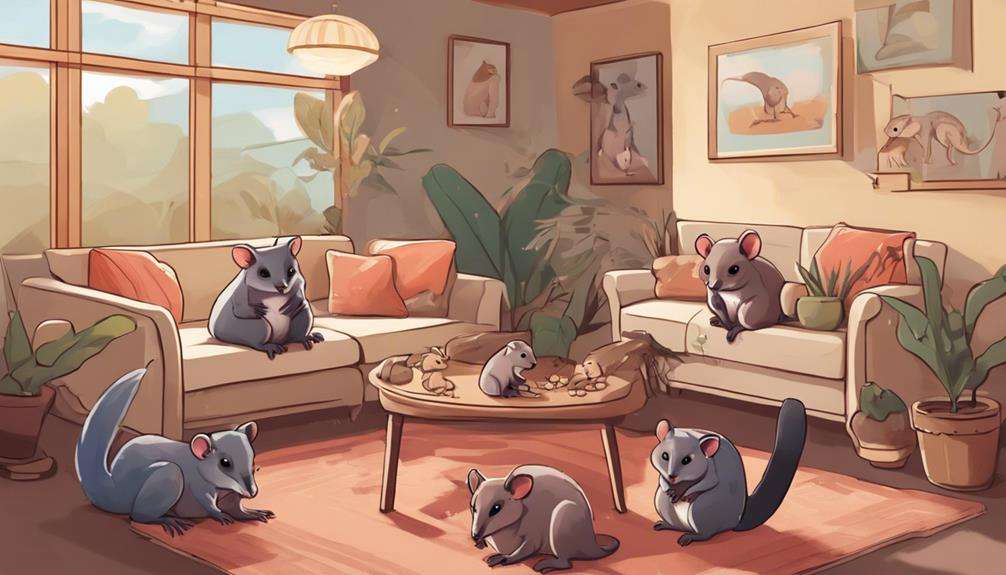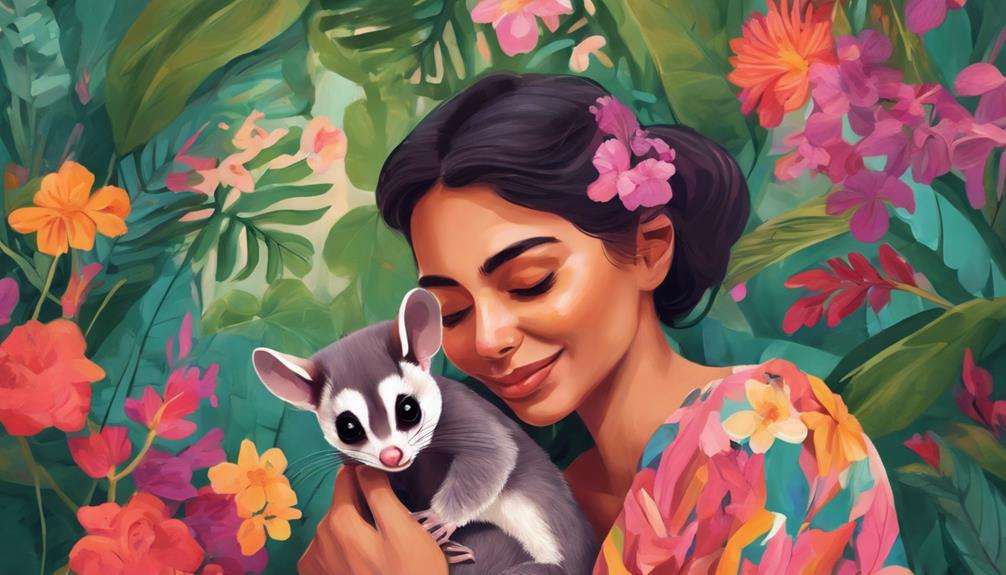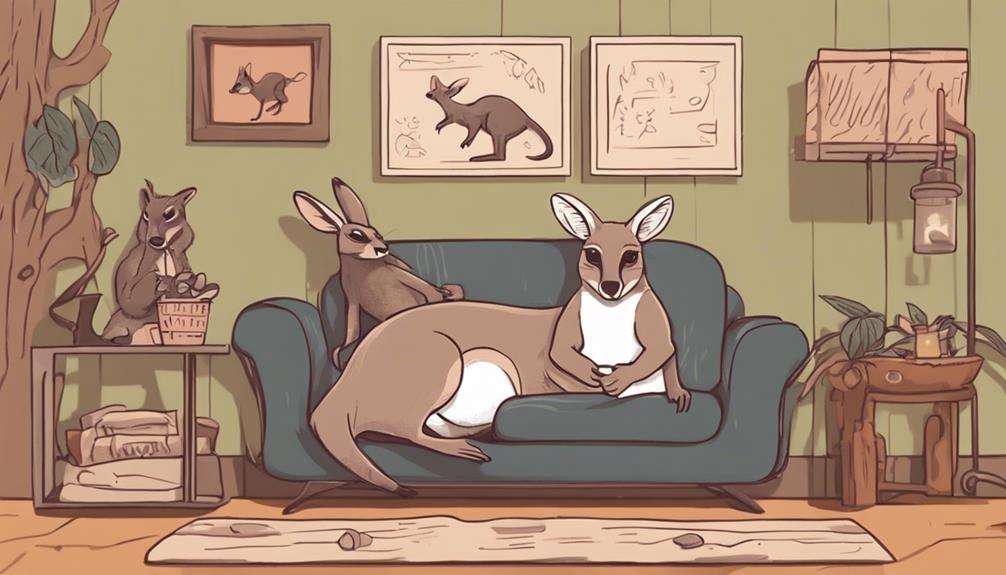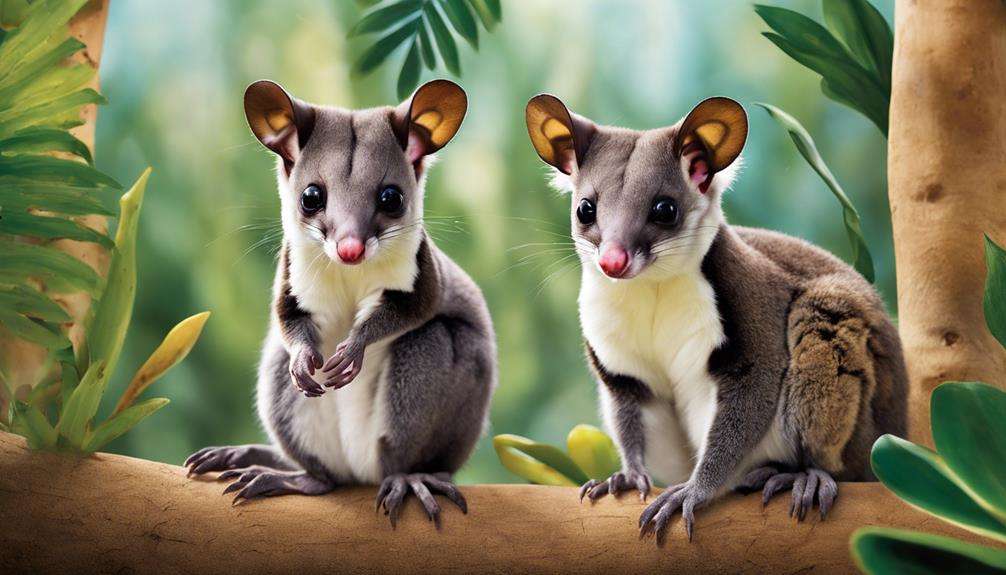Curious about adding a touch of the exotic to your pet collection? Ever considered the unique companionship of marsupials? Their charming quirks and care needs might surprise you.
But before you take the leap, wouldn't you want to know more about these captivating creatures and what makes them stand out as pets?
Key Takeaways
- Marsupials like wallabies and quokkas require specialized care and unique diets for optimal health.
- Understanding and meeting the specific needs of marsupials is essential for responsible ownership.
- Providing a large, stimulating environment with proper diet and social interaction is crucial for their well-being.
- Companionship, space for natural behaviors, and consulting with experts enhance the marsupial ownership experience.
Unique Marsupials as Exotic Pets
When considering unique marsupials as exotic pets, it's crucial to understand their specific care requirements and natural behaviors to ensure their well-being in captivity. Exotic pets require a specialized diet tailored to their needs, such as sugar gliders, which need a diet rich in fruits, vegetables, proteins, and supplements to mimic their natural feeding habits. These marsupials have a unique digestive system that requires a careful balance of nutrients for their health.
Sugar gliders, with their gliding membranes and nocturnal nature, need a large cage with plenty of space for climbing and gliding. Providing a variety of perches, branches, and toys can help stimulate their natural behaviors and prevent boredom in captivity. Additionally, bonding with sugar gliders is essential for their well-being, as they're social animals that form strong attachments to their owners.
Understanding the specialized diet and behavioral needs of marsupials like sugar gliders is key to providing optimal care and ensuring they thrive as exotic pets.
Quirky Traits of Marsupial Companions
Exploring the endearing and distinctive characteristics of marsupial companions reveals fascinating insights into their social behaviors and unique adaptations for survival in their natural habitats. As exotic pet owners, understanding the quirky traits of these small mammals is crucial for providing the best care possible.
Wallabies and quokkas, with their specialized dietary needs, require the expertise of an exotic pet vet who possesses the specialized knowledge to ensure their well-being.
These marsupials exhibit remarkable behaviors that make them intriguing companions. Wallabies, known for their distinctive hopping behavior, use this unique method of locomotion to cover vast distances efficiently. Quokkas, often dubbed the 'happiest animal' for their friendly and smiling expressions, thrive in social groups, emphasizing their need for companionship. Their herbivorous diets, consisting mainly of leaves, grass, and vegetation, require careful attention to meet their nutritional requirements adequately.
To provide optimal care for these marsupial companions, it's essential to consult with an exotic pet vet who understands their dietary needs and social behaviors, ensuring a fulfilling and enriching experience for both pet and owner.
Unconventional Marsupials for Pet Lovers
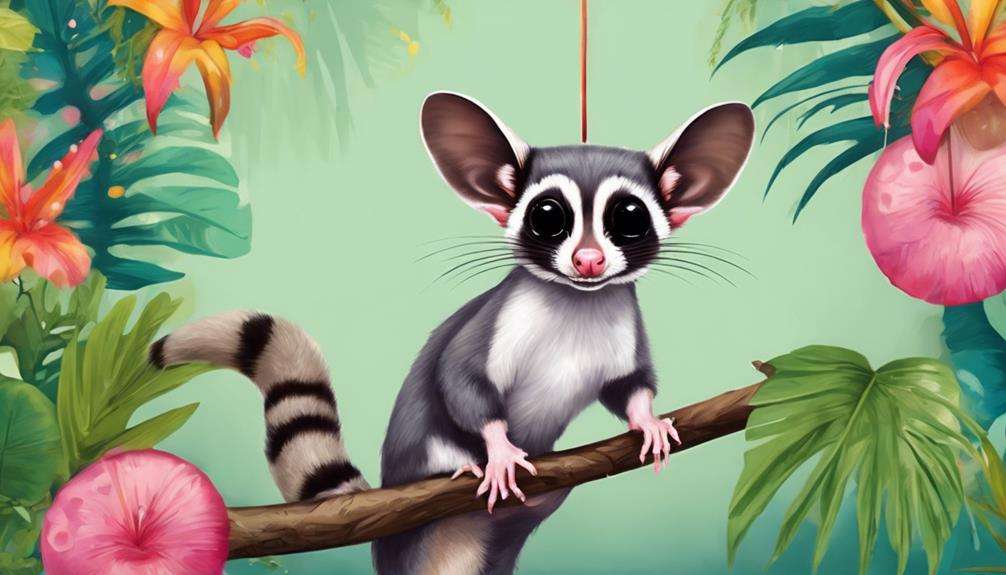
Delving into the world of exotic pets, one may find themselves drawn to the allure of unconventional marsupials as charming companions. These specialized pocket pets, such as wallabies and quokkas, offer a unique experience for those looking to venture beyond traditional pet choices.
Here are some facts to consider:
- Wallabies: These small marsupials, similar to kangaroos, require ample space for hopping and exercise to thrive in captivity. They're social animals that benefit from companionship, requiring suitable care and interaction for their overall well-being.
- Quokkas: Herbivorous marsupials native to Australia, quokkas primarily feed on leaves, grass, and stems. Known for their friendly demeanor and smile-like expressions, they make charming and unique exotic pets, though they also have specific care requirements to ensure their health and happiness.
- Care Requirements: Both wallabies and quokkas have specialized needs, including a suitable diet, spacious habitats, and social interaction. Understanding these requirements is crucial for providing proper care and ensuring a fulfilling relationship with these unconventional marsupials.
Marsupials With Surprising Pet Potential
Wallabies and quokkas, two intriguing marsupials with surprising pet potential, present unique opportunities for exotic animal enthusiasts seeking unconventional companions. Wallabies, resembling smaller kangaroos, require ample space for hopping and exercise to thrive. These social animals benefit greatly from companionship, which contributes to their overall well-being and mental stimulation.
On the other hand, quokkas, herbivores native to Australia, primarily feed on leaves, grass, and stems. Known for their endearing smiling expressions, quokkas have garnered popularity in pop culture and among animal enthusiasts.
Both wallabies and quokkas offer a glimpse into the diverse and fascinating world of marsupials, making them excellent choices for those looking to have unique exotic pets. Their distinct characteristics, from the wallabies' need for space and social interaction to the quokkas' charming demeanor, provide owners with rewarding experiences and the chance to care for these captivating creatures in a responsible and enriching manner.
Rare Marsupials That Make Great Pets
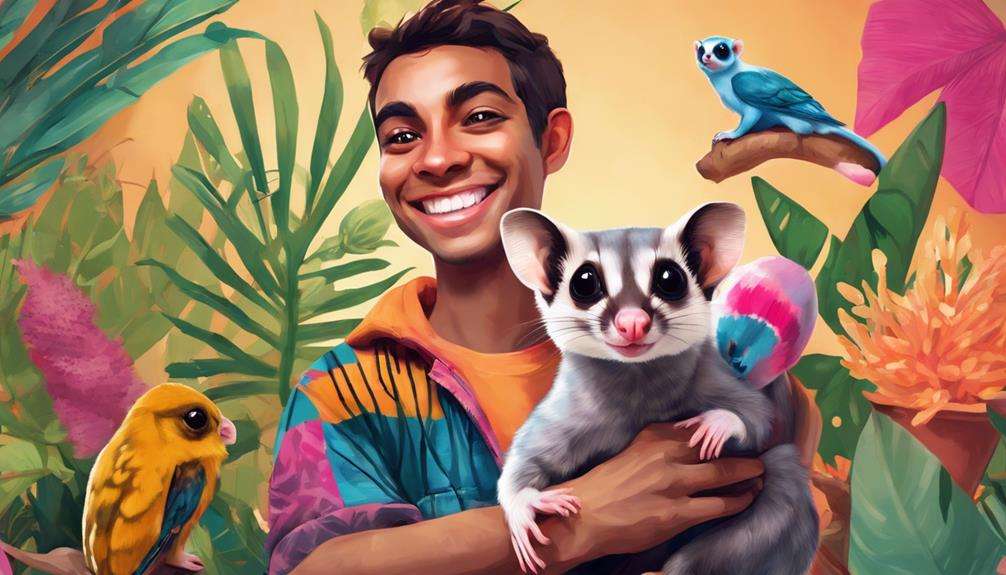
Wallabies and quokkas are rare marsupials that can make great pets under the right circumstances. Understanding their unique dietary needs and habitat requirements is crucial for their well-being.
Consider legal regulations and care tips to ensure a fulfilling and responsible ownership experience.
Unique Marsupial Pets
Exploring the realm of unique marsupial pets reveals a fascinating array of rare species that can make excellent companions for dedicated caregivers. When considering these exotic marsupials as unique pets, it's essential to understand their social nature, the need for a well-balanced diet, and the space requirements for their physical and mental well-being.
- Sugar Gliders: These small, nocturnal marsupials are known for their gliding ability and strong bonds with their owners, making them delightful companions.
- Quokkas: Hailing from Australia, these small herbivorous marsupials thrive on a diet of leaves, grass, and stems, requiring a well-balanced diet to ensure their health and vitality.
- Wallabies: Social creatures similar to kangaroos but smaller, wallabies need ample space to hop and exercise, promoting their overall well-being and happiness.
Care Tips for Marsupials
To properly care for rare marsupials that make great pets, it's crucial to provide a specialized diet tailored to their unique nutritional needs. Marsupials like sugar gliders and wallabies require a balanced diet consisting of fruits, vegetables, nuts, and specialized pellets. Sugar gliders, being nocturnal, also need a protein source like insects. Ensure fresh water is always available.
In addition to diet, social interaction is vital for these exotic pets. Spending time with them, providing mental stimulation, and creating opportunities for natural behaviors like gliding or hopping are essential. Offering them ample space to move around and exercise is crucial for their physical health.
Legal Considerations for Ownership
Considering the specialized care requirements for rare marsupials mentioned earlier, understanding the legal considerations for ownership is paramount when considering these unique pets. Some rare marsupials that make great pets may have legal restrictions on ownership due to conservation concerns. It's essential to research and understand the specific legal regulations surrounding the ownership of rare marsupials as pets.
Conservation efforts may restrict the ownership of certain rare marsupials to prevent exploitation and protect wild populations. Legal considerations play a crucial role in determining the feasibility and ethical implications of owning rare marsupials as pets. Consultation with local authorities or exotic animal experts can provide valuable insights into the legal aspects of owning rare marsupials as pets.
Marsupials: Unusual Yet Lovable Pets
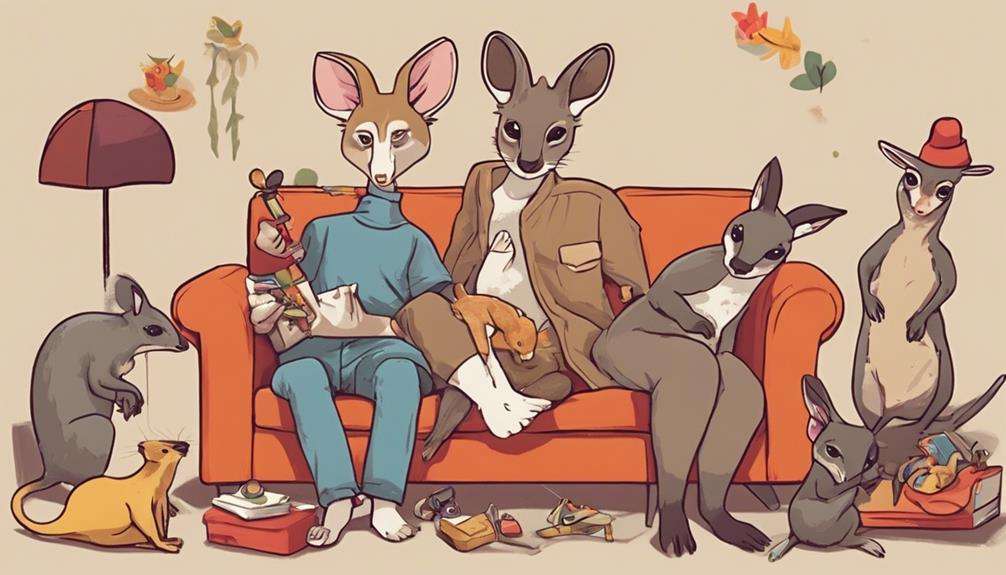
Marsupials, such as wallabies and quokkas, stand out as distinctive exotic pets due to their remarkable pouches designed for nurturing and carrying their young. Wallabies, known for their energetic hopping, require ample space to exercise, making them ideal for owners with large outdoor areas. These herbivores have a diet primarily composed of leaves, grass, and stems. Social creatures by nature, wallabies thrive in the company of their own kind, benefiting from companionship for their overall well-being.
On the other hand, quokkas, native to Australia, are adored for their friendly and curious demeanor. These gentle herbivores make captivating pets with their adorable appearance. Their diet mainly consists of vegetation, and they're known to be docile companions. Quokkas are fascinating to observe and interact with due to their playful nature and charming disposition. When considering a marsupial as a pet, both wallabies and quokkas present unique and endearing qualities that make them lovable additions to a household.
Embracing the Marsupial Pet Experience
Embrace the unique and enriching experience of owning a marsupial pet, such as a wallaby or quokka, by understanding their specific needs and behaviors. When caring for these exotic pets, consider the following:
- Ample Space: Marsupials like wallabies and quokkas require sufficient space to hop and engage in social interactions. Providing a large, secure enclosure mimicking their natural habitat is essential for their well-being.
- Herbivorous Diet: Quokkas, small marsupials native to Australia, have a herbivorous diet consisting mainly of leaves and grass. Ensuring they have access to a variety of fresh vegetation is crucial for their nutritional needs and overall health.
- Social Interaction: Wallabies, resembling kangaroos but smaller in size, thrive in social settings and benefit from companionship. Consider having at least two wallabies to promote their mental and emotional stimulation, contributing to their happiness and quality of life as pets.
Understanding these key aspects of marsupial care will enhance your pet ownership experience and foster a fulfilling relationship with these captivating creatures.
Frequently Asked Questions
What Is the Rarest Exotic Pet?
The rarest exotic pet is the tree kangaroo, a unique marsupial from Australia and New Guinea. These unusual species are fascinating companions but challenging to acquire and care for responsibly due to their rarity.
What Marsupials Can You Have as Pets?
You can have wallabies and quokkas as pets. These marsupials, along with sugar gliders and possums, make fascinating companions. Remember, bilbies, numbats, koalas, and wombats are other unique options for those seeking exotic marsupials as pets.
Is It Legal to Own a Pet Jerboa?
Yes, it is crucial to check the legalities of owning a pet jerboa in your region. Research jerboa care, habitats, behavior, and diet to ensure you can provide the appropriate environment for these unique creatures.
What Is the Coolest Exotic Pet?
When deciding on the coolest exotic pet, consider unusual companions with unique personalities, exotic care requirements, and fascinating behaviors. Each species offers a distinctive allure, making your choice an exciting and rewarding experience.
Conclusion
Congratulations on embarking on the fascinating journey of caring for quirky marsupials as exotic pets! With their unique traits and surprising pet potential, these rare and lovable creatures will surely bring joy and excitement to your life.
Embrace the marsupial pet experience and witness the wonders of nature up close. Prepare to be amazed by the unconventional charm and endearing nature of these marsupial companions.
Get ready for a one-of-a-kind adventure with your new exotic pet marsupial!
